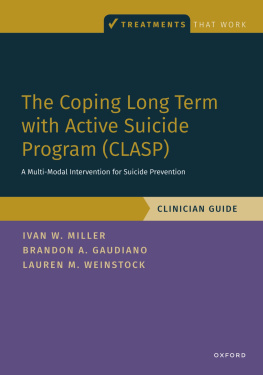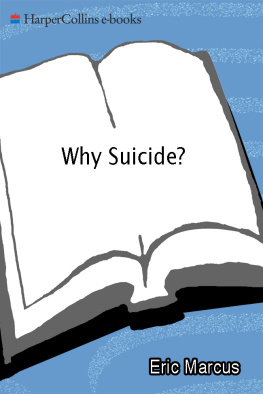
Police Suicide
This text makes a primary and informed contribution to a subject that is under-researched in the UK the suicide of those who work in the UK police service by offering an analysis of UK case-studies of officers and staff who have either completed suicide or experienced suicide ideation, and referring to the likely prime suicide precipitators in these situations. This analysis is followed by an examination of literature that discusses general and police-specific suicide. The text then examines intervention measures and support mechanisms that are currently offered to those working in the police service, as well as other measures that might be introduced in the future. Designed for criminal justice professionals and affected laypeople, including the families of those in the police service, Police Suicide is a crucial text for any who have an interest in the holistic and psychological welfare of police officers and staff.
Richard Armitage, PhD, attended Kings College London from 1969 to 1972, after which he was awarded the academic qualification Associate of Kings College. In 1974 he was ordained priest in the Church of England. He served as a voluntary police chaplain with West Mercia Police for many years, and was Senior Chaplain to Wiltshire Police (UK) from 2005 until 2016. He gained a PhD from Birmingham University in 2007 and has been awarded a research grant by the Home Office Police Research Group Award Scheme. His works include Police Chaplaincy: Servant to the Service and the published thesis Issues of Religious Diversity Affecting Ethnic Minority Personnel in the Workplace. Armitage has been invited to speak at various conferences and to advise on the development of chaplaincy to the police at national, regional and local levels.
Police Suicide
Risk Factors and Intervention Measures
Richard Armitage
First published 2017
by Routledge
711 Third Avenue, New York, NY 10017
and by Routledge
2 Park Square, Milton Park, Abingdon, Oxon, OX14 4RN
Routledge is an imprint of the Taylor & Francis Group, an informa business
2017 Taylor & Francis
The right of Richard Armitage to be identified as author of this work has been asserted by him in accordance with sections 77 and 78 of the Copyright, Designs and Patents Act 1988.
All rights reserved. No part of this book may be reprinted or reproduced or utilised in any form or by any electronic, mechanical, or other means, now known or hereafter invented, including photocopying and recording, or in any information storage or retrieval system, without permission in writing from the publishers.
Trademark notice: Product or corporate names may be trademarks or registered trademarks, and are used only for identification and explanation without intent to infringe.
Library of Congress Cataloging in Publication Data
Names: Armitage, Richard Norris, author.
Title: Police suicide : risk factors and intervention measures / Richard Armitage.
Description: New York, NY : Routledge, 2017.
Identifiers: LCCN 2016058666 | ISBN 9781138221376 (hardback) | ISBN 9781138050822 (paperback)
Subjects: LCSH: Police--Suicidal behavior--Great Britain.
Classification: LCC HV7936.S77 A76 2017 | DDC
362.28088/36320941--dc23LC record available at https://lccn.loc.gov/2016058666
ISBN: 978-1-138-22137-6 (hbk)
ISBN: 978-1-138-05082-2 (pbk)
ISBN: 978-1-315-41061-6 (ebk)
Typeset in Goudy
by Sunrise Setting Ltd, Brixham, UK
Contents
This book focuses on the suicidal ideation of police officers and staff. My attention was drawn to the importance of this issue following a series of suicides of officers and others who had recently retired from officer roles. The pain and distress of those who had taken their own lives must have been acute. As a consequence of their deaths, this pain will have been reflected in the distress of families and in the deep concern of close friends and colleagues. For my part, a greater appreciation of the contextual causes of the suicides was required.
Having embarked on measures to acquire a greater appreciation of relevant factors, it became apparent that no previous UK research of any substance had addressed the issue of suicides of those who work in the police environment. The focus of the proposed research was determined: it would examine suicide among those who work in the police service, offering an analysis of risk factors and an identification of appropriate intervention measures, with the intention of reducing the number of completed suicides and parasuicide incidents.
To fulfil this intention, the book first examines the difficulty of undertaking relevant research, including acquiring pertinent data. Having determined these difficulties, it analyses a number of case-studies and identifies key precipitators. The analysis of these precipitators is considered alongside a survey of literature on police-specific suicide. This literature is primarily from the US, where a great deal of research has been undertaken into this subject.
The book then examines intervention measures which may assist in reducing the number of suicides among those who work in the police service. The implementation of preventative measures is the responsibility of many, including police forces, family, close friends and individuals within the police service.
As the analysis of these issues concludes with recommendations for the implementation of intervention measures, the book is useful to those responsible for the creation of policies that relate to the employment of officers and staff. Equally, it is a valuable resource for officers, staff, their families and any who have a concern for the well-being of those who work within the police service.
I express my deep gratitude to Dr Tim Meaklim, an independent learning consultant and academic, previously a senior officer in law enforcement. I thank him for his supportive and affirming supervision of my research.
I express my gratitude to the families, friends and colleagues of those officers and staff who have supported my research in many different ways. They have given freely of their time and shared their innermost thoughts, which at times has been painful for them.
I express my gratitude to those officers, staff and others who work with the police service and have supported and believed in the aims of this research. Their commitment to the purpose of this study has given me the energy to pursue the objective to its conclusion.
Finally, I express my gratitude to those who currently work within the police service for their commitment to all they strive to achieve. Their dedication, often under great stress, has been the absolute motivation to undertake this research.
Acas | Advisory, Conciliation and Arbitration Service |
ACPO | Association of Chief Police Officers |
ACT | Australian Capital Territory |
AFP | Australian Federal Police |
BBC | British Broadcasting Corporation |
BMJ | British Medical Journal |
DCC |











